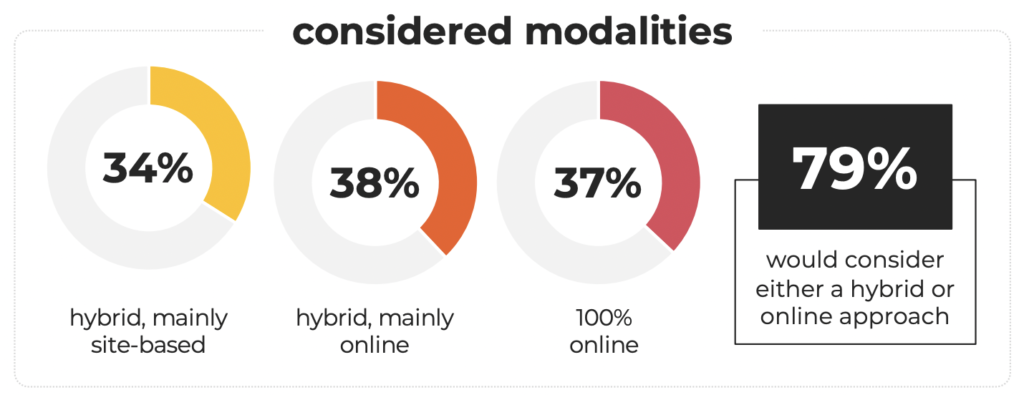When Are Online Certificates Worth It? 5 Questions to Ask

Let’s face it—the way we do business is changing too fast for most of us to keep up. Professionals and organizations alike face complex challenges that require highly specific knowledge and skills, many of which can be hard to acquire on the job.
But gaining that knowledge through traditional channels, like a graduate degree, requires a significant investment of time and money.
That’s where online certificate programs come in.
What is an online certificate?
Online certificates are credentials earned through virtual academic programs. Compared with degree programs, they are typically shorter and more targeted, focusing on developing specific skills and lasting weeks to months rather than years. This condensed format generally comes with a much lower price tag than a degree.
For many professionals, certificate programs hit the sweet spot of practicality, affordability, and flexibility. For organizations, they provide an opportunity to upskill or reskill employees quickly and effectively.
Is an online certificate right for you?
While online certificates offer a great opportunity to grow your skills, they may or may not be the right choice for your specific situation. Here are five questions to ask to make that determination.
1. What are your goals?
First things first—before you enroll in a program of any kind, you will need to identify what you want to learn and why. Whether you’re in an entry-level role or you’re a C-suite executive, you will benefit most if you have clear goals when it comes to career progression.
Aiming to take on new responsibilities, get a promotion, or switch roles? Consider what qualifications you need. Talk with colleagues or members of your network who are in similar roles to learn what skills are essential to their day-to-day responsibilities. If you plan to apply for stretch positions, online certificates show that you’ve taken the initiative to gain crucial knowledge.
Certificates are also valuable for professionals whose roles have changed due to emerging technologies or shifts in business practices. They provide a targeted opportunity to gain comfort and expertise with new tools and strategic approaches.
2. Is a degree program or a certificate a better fit?
While many top universities offer both online certificates and online degrees, the two are very different undertakings.
Online degree programs:
- Usually 2-4+ years
- Have a high weekly time commitment (often 20+ hours a week)
- Can cost tens of thousands of dollars
- Focus on a broader field
Online certificate programs:
- Range from weeks to months
- Have a lower weekly time commitment (Emeritus courses average 8-10 hours)
- Have lower fees
- Offer a narrower focus
Whether a degree program or a certificate is right for you will depend on your field and goals. Some companies may require a specific master’s degree or scope of knowledge beyond what certificate programs offer.
But for many roles, a master’s is not required and may not deliver the return on investment (ROI) to justify its higher cost and time commitment. Plus, many degree programs focus more on theory than on application. In these cases, a specialized certificate designed for professionals may be a better fit.
It’s no surprise then that the popularity of certificates is soaring—in fact, they now make up 22% of postsecondary credentials.
3. Is online learning right for you?
In addition to on-campus programs, certificates are widely available in virtual and hybrid formats. According to our research, more than three-quarters of learners would consider a course that is at least partially digital. However, the virtual environment has pros and cons.

The students most likely to thrive in online certificate programs are self-motivated, organized, and comfortable engaging digitally. The format is also well-suited to learners whose job commitments and personal life make full-time, in-person program attendance a challenge. Plus, online learning removes travel expenses from the equation.
On the other hand, students who struggle to maintain focus in a digital environment or prefer in-person interaction may be better served by an on-campus certificate program.
4. What is the ROI of an online certificate?
Are online certificates worth it for you or your team? While a specific certificate’s ROI is influenced by field and program, Forbes reports that certificates generally lead to a 13-25% salary boost. For many professionals, that means earning back the cost of the certificate dozens of times over.
Online certificates are also a valuable networking opportunity. Since many offerings attract global professionals from a wide range of industries, they provide the rare chance to engage with potential future colleagues you may have never met otherwise.
5. Which online certificate is most valuable for you?
But how do you know which online certificate is worth getting?
Once you’ve identified the skills that you’re hoping to develop, actually deciding on a program can be a challenge. Key questions to ask include:
Is the certificate associated with an accredited university?
Generally speaking, a certificate from a program conducted with a respected, accredited university will carry more weight than a certificate from an unaffiliated company.
Who is teaching the course?
Look up the course instructor to ensure they have specific academic or professional expertise in the field.
Does the program curriculum cover what you hope to learn?
Ensure the program delivers the content you need to meet your goals, like training in coding languages or social media programs.
What are the program’s fees?
Fees can vary significantly between certificate programs; compare options to identify a certificate that fits within your personal or professional development budget.
What is the program’s expected time commitment, and is the schedule flexible?
Will you realistically be able to manage the program’s workload in the time allotted? Is the program flexible enough to accommodate your work and personal schedule? Emeritus programs on average require an 8-10 hour per week commitment, but programs may vary significantly in their workload.
Planning Your Next Steps
Emeritus offers online certificates to reskill and upskill within your organization in fields ranging from data science to innovation and design thinking. All our certificate programs are delivered in collaboration with leading professors from the world’s top universities, ensuring your employees emerge with skills and knowledge to set them apart. Get in touch with Emeritus to learn more.
{“@context”:”https://schema.org”,”@type”:”FAQPage”,”mainEntity”:[{“@type”:”Question”,”name”:”What is an online certificate?”,”acceptedAnswer”:{“@type”:”Answer”,”text”:”Online certificates are credentials earned through virtual academic programs. Compared with degree programs, they are typically shorter and more targeted, focusing on developing specific skills and lasting weeks to months rather than years. This condensed format generally comes with a much lower price tag than a degree. “}},{“@type”:”Question”,”name”:”Is an online certificate right for you?”,”acceptedAnswer”:{“@type”:”Answer”,”text”:”While online certificates offer a great opportunity to grow your skills, they may or may not be the right choice for your specific situation. Here are five questions to ask to make that determination. \n\n1. What are your goals?\n2. Is a degree program or a certificate a better fit?\n3. Is online learning right for you?\n4. What is the ROI of an online certificate?\n5. Which online certificate is most valuable for you?”}},{“@type”:”Question”,”name”:”Is a degree program or a certificate a better fit?”,”acceptedAnswer”:{“@type”:”Answer”,”text”:”While many top universities offer both online certificates and online degrees, the two are very different undertakings. \n\nOnline degree programs:\n\nUsually 2-4+ years \nHave a high weekly time commitment (often 20+ hours a week)\nCan cost tens of thousands of dollars\nFocus on a broader field\n\nOnline certificate programs:\n\nRange from weeks to months\nHave a lower weekly time commitment (Emeritus courses average 8-10 hours)\nHave lower fees\nOffer a narrower focus “}},{“@type”:”Question”,”name”:”Is online learning right for you?”,”acceptedAnswer”:{“@type”:”Answer”,”text”:”In addition to on-campus programs, certificates are widely available in virtual and hybrid formats. According to our research, more than three-quarters of learners would consider a course that is at least partially digital. However, the virtual environment has pros and cons.\n\nThe students most likely to thrive in online certificate programs are self-motivated, organized, and comfortable engaging digitally. The format is also well-suited to learners whose job commitments and personal life make full-time, in-person program attendance a challenge. Plus, online learning removes travel expenses from the equation.\n\nOn the other hand, students who struggle to maintain focus in a digital environment or prefer in-person interaction may be better served by an on-campus certificate program.”}},{“@type”:”Question”,”name”:”What is the ROI of an online certificate?”,”acceptedAnswer”:{“@type”:”Answer”,”text”:”Forbes reports that certificates generally lead to a 13-25% salary boost. For many professionals, that means earning back the cost of the certificate dozens of times over. \n\nOnline certificates are also a valuable networking opportunity. Since many offerings attract global professionals from a wide range of industries, they provide the rare chance to engage with potential future colleagues you may have never met otherwise.”}}]}

